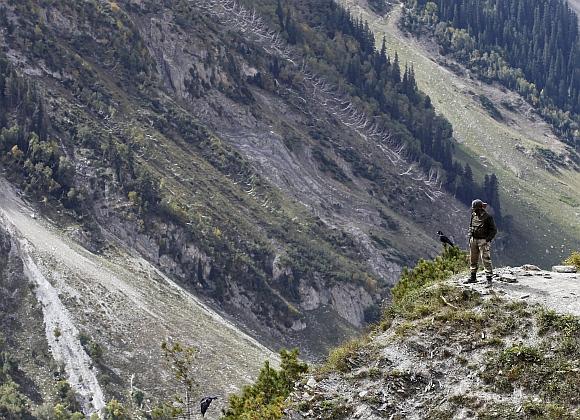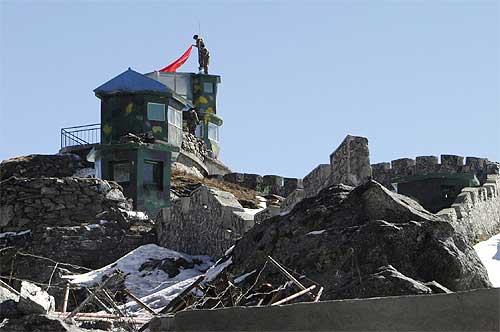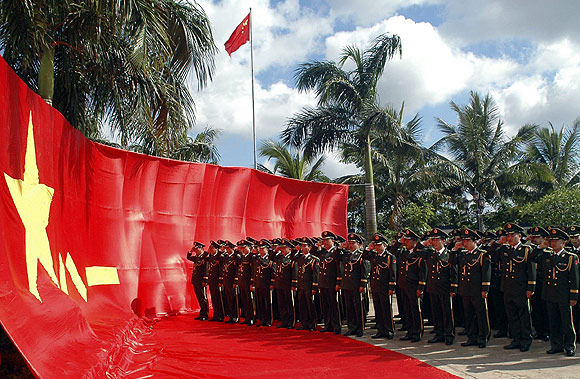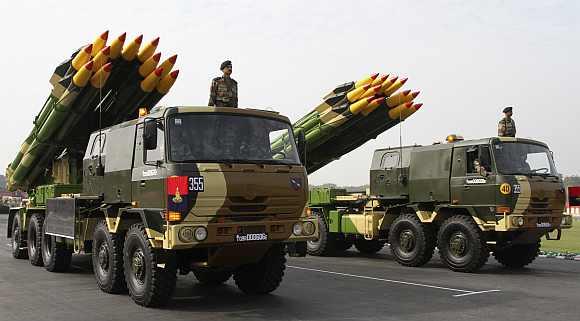 | « Back to article | Print this article |
The scar of Depsang will remain
The Chinese return to their previous position is a lesson that we will have to learn if we want to live as a proud and powerful nation. A weak and meek government is neither respected by its electorate nor by the neighbours whom it wants to befriend, says Tarun Vijay
The Chinese intrusion and the withdrawal is a little bit like a rewind of 1962. Then too, we were no match to the Chinese firepower and numerical military strength. Yet they withdrew.
Henry Kissinger describes it, "China executed a sudden, devastating blow on the Indian positions and then retreated to the previous line of control, even going so far as to return the captured India heavy weaponry." And why did China do that? As Mao Zedong has been quoted by Kissinger, the logic behind this 'blow' "was that China and India were not doomed to perpetual enmity. They could enjoy a long period of peace again, but to do so, China has to use force to "knock" India back "to the negotiating table".
Kissinger was no friend of India and we may reject his thesis. Still his lines look so true in perception if we mirror the 2013 Depsang valley intrusion by the Chinese in the war-wisdom of Chairman Mao.
True, the Chinese have returned to their old positions and so have we. The area was claimed by us and the Chinese both, they came and pitched their tents, so we too reached closer to them and ensured they understand the firewall of the Indians. So we too have returned to our pre-crisis position, which should NOT be termed as withdrawal from our posts.
Now, though Salman Khurshid may enjoy his share of Peking duck in Beijing and the Chinese premier would ceremoniously come to Delhi as his first trip abroad, but the scar of Depsang would remain.
Click NEXT to read further...
China has succeeded in exposing cracks in our defence line
It has shaken the Indian establishment and has given a rude shock to the people who were, slowly coming to accept a hesitant friend in China having sung the bitter, painful songs for five decades at almost every republic and Independence Day celebrations. We almost tried hard to forget the unanimous resolution passed by the Parliament in the wake of the 1962 Chinese aggression that resolved to take back all that land captured illegally by China.
For whatever China means to us, bilateral trade increased leaps and bounds, clouds of suspicions were ignored to clear a People's Liberation Army stakeholder -- Chinese company Huawei's India operation. Road contracts in a border state like Himachal Pradesh were given to the Chinese construction firms. A parliamentary forum on India-China friendship was activated. A highly imbalanced bilateral trade favouring China was simply termed as a sign of increasing trust and we felt shy to have it corrected to help Indian traders and businessmen.
So why did they do it just before the high profile visit of their premier?
It may be to extract maximum from India by re-emphasising their land claims, to keep us in perpetual awe of their might and restrict our movements, construction activities and roads coming up on the border side.
It's difficult to say if they would succeed in these goals, still strategically they have succeeded in exposing the cracks in our defence line.
Chinese positions on the Burshe point in Depsang valley is too deep inside the area claimed by India which can be approached only through Raki Nullah, a deadly difficult terrain to negotiate. Defence strategists know if they have built up roads up to this point, it means they are breathing on our neck. Their departure to the previous position means nothing because the purpose of their intrusion was to show us their penetrating strength and with a hard-hitting military sarcasm, they capped the operation with a red banner telling us -- Please go back.
The region is almost inoperable for the India armed forces. Secondly, for some strange reasons, it has been handed over to the Indo-Tibetan Border Police, which doesn't even report to the local army commander. The decision maker, a deputy inspector general, sits in Leh, almost 300 km away and the inspector general in Srinagar. A small platoon of the Indian Army is at Daulat Beg Oldi, unable to operate at such far-flung and high altitude areas like Burshe to make a sudden impact.
Click NEXT to read further...
Local Ladakhis carelessly speak about Chinese intrusions
For the last 17 years I have been visiting Ladakh every year. Local Ladakhis speak about the Chinese intrusions, their pamphlets, posters, smuggled locks, sandalwood and cigarettes left by PLA soldiers as normally and carelessly as they speak about rains, hot summer or the sudden floods in the Indus River.
Last year the deputy commissioner of Leh, officially complained to the Srinagar administration and through them the Union home ministry that the Chinese didn't allow local villagers to celebrate Independence Day at Koil village near Demchhok, and also had a bridge dismantled on the Indus while stopping labourers from working on a road, well inside the definitive India territory.
I raised the issue in Parliament, gave the details to Defence Minister A K Antony and issued a press statement (external link).
Nothing happened. It was as if everybody tried to put it under some carpet.
The area is mineral rich and traces of high quality uranium have been found there. It is a lifeline for the Indian armed forces to connect with the Karakoram sector. The Pengong Tse lake, highest salt-water body in the world, is in this area, 2/3rd in China and rest with us. Our speedboats are no match to the boats the Chinese have. They can accommodate one full company of PLA soldiers in their fleet of boats. We can't even carry a small posse of ten. Can you imagine the effect on the morale of our soldiers?
The babus, the IAS lobby, that controls the defence requirements, releases the budget to build roads by Border Roads Organisation, sanctions new projects and is scarcely concerned about meeting time lines, they hardly visit the area or take a holistic view of the threats and the fortification needed.
Click NEXT to read further...
In India defence never becomes an issue to judge political parties
Pathetically the blame of the Chinese intrusion is again being passed on to the Indians by some highly professional journalists who think they belong to mars and have to be candid and objective to report the Indian position. Their logic is since India began constructing roads and airfields at a feverish pitch recently, it provoked the Chinese to act and warn India. Simply garbage.
India woke up late, yes, but the Indian activities are well deep within definitive Indian territory. And our build up is still at a nascent stage. One example is the Rezang La sector, where we don't have a road, still, although we fought a heroic battle there in 1962 (Major Shaitan Singh's 13 Kumaon).
The Chinese have constructed a beautifully tarred road, with drainage system in order on both sides of the road, just 200 metres from our kaccha pathway to the posts. Their border area construction activities have been going on at an incredible pace and the intelligence inputs are that wherever they found an area less patrolled by the Indians, they have made fully tarred approach roads leading to our present positions.
We lack in roads, manpower and intra-forces coordination.
Such a criminal neglect of our defences would result in the fall of the government anywhere else in the world.
India might be the only country where the nation's defence never becomes an issue to judge political parties.
The Chinese return to their previous position is a lesson that we will have to learn if we want to live as a proud and powerful nation. A weak and meek government is neither respected by its electorate nor by the neighbours whom it wants to befriend.
Tarun Vijay is a Bharatiya Janata Party Member of Parliament in the Rajya Sabha
TOP photo features of the week
Click on MORE to see another set of PHOTO features...




